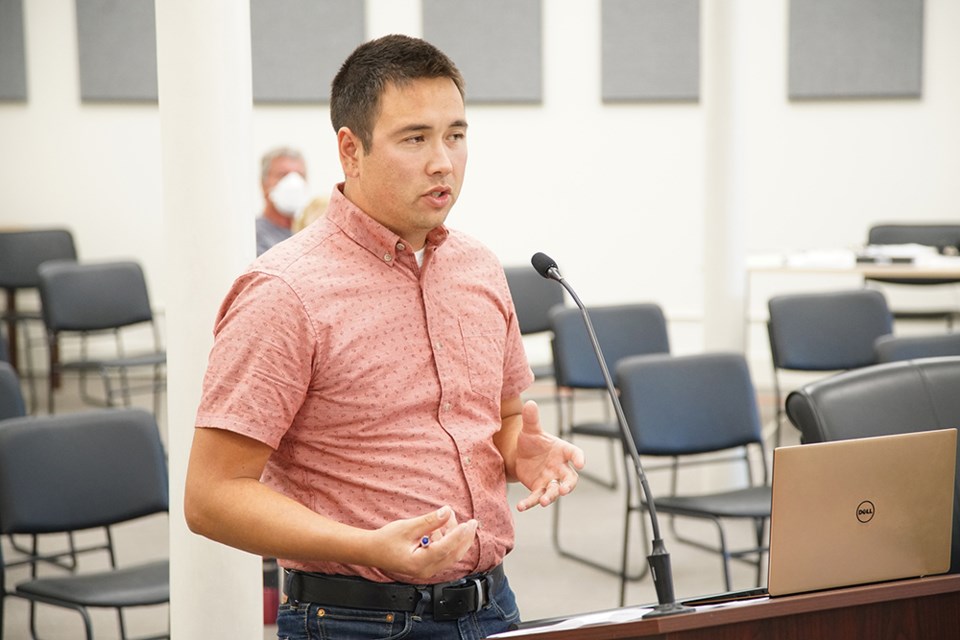City of Powell River councillors were provided an overview and three scenarios for taxation in 2022.
At the February 1 committee of the whole meeting, chief financial officer Adam Langenmaier, after all city department heads had reported on departmental activities, provided a summation on various aspects of the budgeting process.
Langenmaier said one of the challenges this year was the change to the garbage service. He said in the past, the garbage levy on the tax bill was relatively low, but taxpayers would have to purchase garbage tags.
“That’s gone now; we increased the garbage levy from $79 up to $120 and now you no longer buy tags,” said Langenmaier. “In the scenarios and information I’ve presented, I show a column showing the change, excluding any provision for garbage tags and then a change including a provision for the tags you’re not buying.”
Langenmaier said his assumption was that a home would buy 1.5 tags a week for a total annual cost of $156.
His first scenario for tax assessment was taken from council’s direction at the November 25, 2021, finance committee meeting, where the goal was a taxation increase to 4.1 per cent over 2021. Langenmaier said when looking at the all-in change to an average single-family dwelling, which includes utility changes, the new garbage levy increase and a taxation change, it is a 6.6 per cent increase over 2021. He said, however, that if it is considered that residents are not buying garbage tags anymore, that brings the single-family dwelling taxation change, or cost paid to the city, to a 1.6 per cent increase.
“It will be a more challenging year to nail down what is happening,” said Langenmaier. “When you look at your tax bill from this year to last year, it will be higher, but there are fees you are no longer paying.
Langenmaier then outlined his second scenario. He said it is an all-in change, including utilities and tax on the average single-family dwelling. He said when he calculates that option, it actually results in a decrease when factoring garbage tags no longer being purchased, although the total utilities and cost on the home increase by 4.1 per cent.
The third scenario Langenmaier presented was a blend of what it would look like if the city hit the 4.1 per cent once consideration is given to the ending of the garbage tags. He said that results in a fairly significant increase in taxation, but provides the biggest surplus to the city of $1.8 million.
“The city is in a good place this year because we are in a position of an overall surplus,” said Langenmaier. “Today, we are not recommending needing to make further decisions to cut services. We are in a place where we have adequate funds to cover operating costs and our capital plan.”
Council members comment
Mayor Dave Formosa asked about a 4.1 per cent increase in taxes to the average home, all-in, with utilities. Langenmaier said that would be the second scenario, and not considering the removal of the garbage tags, that would hit the 4.1 per cent figure.
Councillor George Doubt said in the first scenario, for the average single-family dwelling assessed at $535,000, the increase is 1.6 per cent. He said in scenario two, the impact is a reduction in taxes of 0.8 per cent.
Langenmaier said that is correct, when taking into consideration not having to purchase garbage tags. Without the garbage tag reduction factored, the increases would be 6.6 per cent for scenario one and 4.1 per cent for scenario two.
Doubt said for scenario three, the change for the average single-family home is 4.1 per cent, which Langenmaier said was correct. Without factoring the garbage tags, the increase would be 9.3 per cent.
Doubt said each scenario would allow current services to continue in 2022; Langenmaier said that is correct.
Formosa said with scenario one, the taxes for the average home would go up 6.6 per cent, but taking into consideration the $156 average garbage tag purchase impact, the total was listed a 1.6 per cent.
“That’s correct, but you will not be buying garbage tags,” said Langenmaier.
Councillor Jim Palm said all three scenarios would give the city an anticipated surplus. He said he is in favour of scenario two, which would increase taxes 4.1 per cent, and he advocated reducing it even more and getting the increase into the three per cent range.
Councillor Rob Southcott said it is vital for the community to understand that a major fee, garbage tags, has been taken away.
“A lot of people are not going to consider that if they are actually looking at those figures,” said Southcott.
Langenmaier then drew attention to the general operating surplus. He said in January 2021, he reported that the city was in a deficit position of $1.1 million.
“That has been the case in the last two budgets I presented, and this is the first time in many years the city has been in a surplus position,” said Langenmaier. “The financial plan isn’t being balanced by a draw on COVID-19 funding, or prior year’s surplus, or a significant reduction in some special projects.”
He said there are unknowns going forward with the Catalyst Paper Tis’kwat mill in curtailment and construction of the consolidated wastewater treatment plant.
Doubt said when the finance committee gave direction for a 4.1 per cent tax increase, he thought it would be difficult to accomplish, but Langenmaier had done it and given some choices.
The committee voted to receive Langenmaier’s draft one 2022 to 2026 financial plan report for information. They also voted to provide staff with direction regarding 2022 change requests for an additional $154,000.




